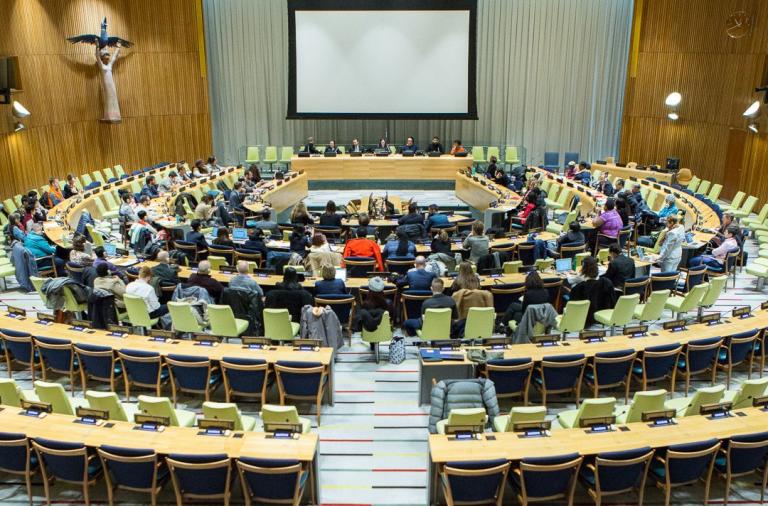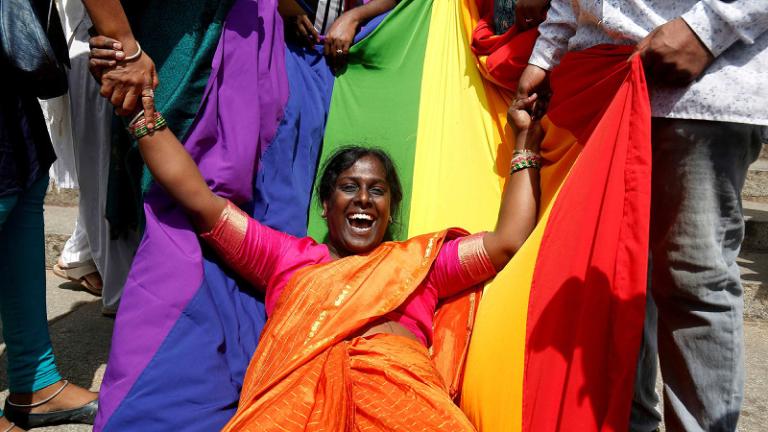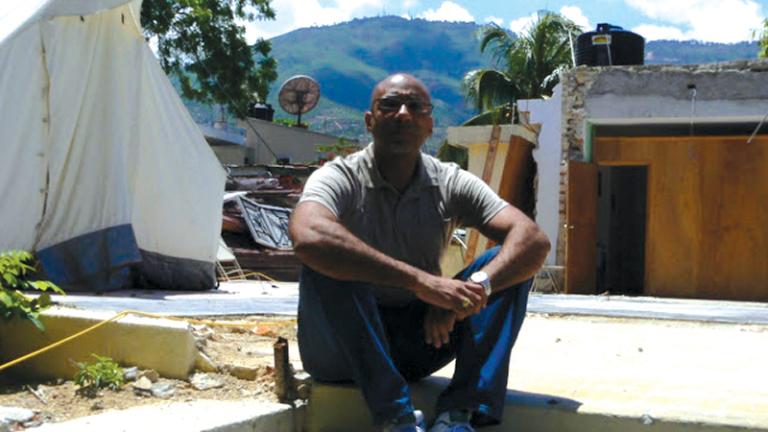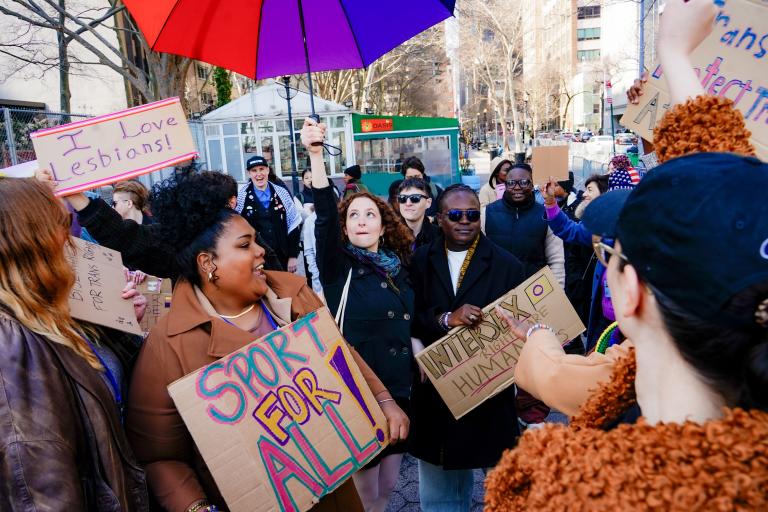
Insights
35 Years of Courage: What It Actually Takes to Build a Movement That Lasts
Region(s)
TOPIC(s)
Type
Commentary
Author(s)
Publish Date
November 21, 2025
Share
The Question We Keep Coming Back To
What does it take to build LGBTIQ movements that last through backlash, through crises, and across generations, and keep turning lived experience into enforceable rights?

(Panel at the United Nations, 2018 Advocacy Week)
Movements don’t begin with tidy slogans; they start with urgency. In 1990, in the teeth of the AIDS crisis—and within a mainstream human rights field that took far too long to see us—activists founded the International Gay and Lesbian Human Rights Commission, now Outright International. They were already documenting abuses against LGBTIQ people at home in the United States and across borders. They were angry that gatekeepers hesitated to name our lives as of equal worth. They were moved by the courage of the era’s direct action movements—ACT UP, Queer Nation—and determined to build a rights organization that could face down so-called sodomy laws, systemic discrimination, and anti-LGBTIQ violence from the United States to Russia and demand that our governments stop treating us as second-class citizens.
It wasn’t about some distant future. The violence and dehumanization were happening then. Issues like marriage equality, legal gender recognition, and intersex people’s bodily autonomy were barely on the horizon; survival and dignity were. Solidarity had to be built person to person, and it had to reach across borders because laws, money, media, and stigma do.
Decades later, we continue to test that founding proposition: that documenting violations, resourcing communities, and linking local struggles to international norms alters the balance of power. Movements grow inch by inch, mostly out of sight, until persistence finally becomes visible.
What 35 Years of Courage Looks Like
India’s 2018 judgment striking down Section 377 was heralded around the world. It wasn’t a sudden turn; it was one landmark in a long pattern of change shaped by years of organizing, litigation, and regional precedent—before and after 2018. That is how the improbable becomes inevitable: groundwork, coalition, argument, time. We were proud, too, to see language from a UN submission originally drafted by Outright reflected in the judgment—a small but meaningful contribution to a decision that has shaped the lives of more than a billion people, and will echo for generations.
When the pandemic shut down the world in March 2020, LGBTIQ groups—already stretched—faced collapse. Outright established a global emergency fund within days and, over the course of two years, allocated $3.8 million to 355 organizations in 108 countries. Hundreds of individual donors and philanthropic partners powered that flow because trust and systems were already in place. Readiness, not improvisation, made tactical strategy and speed possible.
Our evidence base has grown in tandem with this response. Outright’s research and data collection—spanning crisis documentation, program evaluations, and agenda-setting reports—now underpin advocacy at the UN, in parliaments, with partner organizations, and with funders.

(An LGBTIQ activist in Bengaluru, India, celebrates this landmark victory following the court’s verdict, which struck down Section 377, ending a colonial-era law that had long criminalized gay sex.)
The Work Nobody Talks About
Most of the job is unglamorous: keeping relationships warm, reading dense drafts, sitting through long meetings, returning calls, and showing up again. That’s how, in the early 1990s, we pushed back on criminalization and insisted HIV prevention reach people governments preferred to ignore. That’s how, in Beijing in 1995, a “Lesbian Tent” at the UN women’s conference became both a physical and political act of presence—years of quiet groundwork condensed into a visible moment.
And it’s why, in Malawi in 2010, after Tiwonge Chimbalanga and Steven Monjeza were sentenced to 14 years for having a traditional engagement ceremony, mobilization worked: the president pardoned both following international and regional pressure, as well as a meeting and appeal from UN Secretary-General Ban Ki-moon. Tiwonge, a transgender woman, later relocated to South Africa with support from advocates there. The story was messy because people are. What mattered was that local leadership led the strategy, international pressure held, and relationships built beforehand gave the effort a starting line other than zero.
By 2023, when Uganda enacted a law with the death penalty for “aggravated homosexuality,” our emergency systems were already running. Help meant rapid grants to local groups, security planning, psychosocial support, relocation assistance in extreme cases, and policy advocacy coordinated with regional and global partners.
What Actually Strengthens Capacity
Money matters, but consistency is what keeps a movement standing. Reliable support enables groups to plan, hire, train, and maintain momentum through the quiet years between headlines. When we say we work in 108 countries, it doesn’t mean parachuting in for a press cycle. It means years, and sometimes decades, of partnership, so that when something breaks, trust is already there.
The Hard Truth About Right Now
We are not done. More than sixty countries still criminalize consensual same-sex intimacy. Uganda’s 2023 law escalated punishment to the point of death. Russia’s “anti-propaganda” regime has chilled expression into near silence and taught a generation to treat erasure as policy.
Chechnya’s purges left scars that don’t fade on command. Anti-trans copy-and-paste bills move across borders with uncanny speed. Digital surveillance shadows organizing. International aid cuts reverberate straight into the already small budgets of groups doing the most dangerous work. Violence grows. Rights once thought settled are pried back open for debate.
Yet the map keeps moving. Change rarely spreads in tidy lines across a region; progress and backlash coexist. Thailand’s 2025 marriage law mattered in Southeast Asia as proof that gains are possible even amid headwinds, while decriminalization and court wins in countries across the Caribbean, Africa, and South Asia show that different routes can still lead to more freedom. The line bends when people keep pressing.
The Invisible Architecture of Change
The United Nations may seem distant, but infrastructure changes can have a significant impact on outcomes. In 2008, a handful of states formed what is now the UN LGBTI Core Group; today, it is a durable diplomatic home where our issues are not occasional guests. In 2011, the Human Rights Council adopted its first resolution addressing violence and discrimination based on sexual orientation and gender identity. In 2016, the Council established the mandate of an Independent Expert on sexual orientation and gender identity, creating a permanent mechanism for disseminating best practices, monitoring abuses, and holding governments accountable. In 2024, the UN adopted its first resolution focused on the human rights of intersex people. Outright serves as the secretariat of the UN LGBTI Core Group, translating that infrastructure into practical leverage for movements—coordinating briefings, elevating evidence from partners, and helping states carry commitments into policy.
None of this stops a beating in a police station tomorrow. It does give litigators language, parliamentarians cover, and movements leverage they did not have the year before. Scaffolding isn’t a headline, but it is how higher floors get built.

(Outright releases its joint report, “The Impact of the Earthquake, and Relief and Recovery Programs on Haitian LGBT People," with SEROvie on humanitarian relief efforts in 2011)
What Crisis Response Really Means
During COVID-19, emergency grants kept trans-led groups connected when isolation was dangerous. Clinics pivoted to telehealth to sustain hormone therapy and mental health support. Activists under the crackdown secured safe housing and encrypted tools. Those outcomes were possible because donors moved flexible funds through trusted networks—and because partners knew we would listen first, then act quickly.
The Programs You Only See If You’re Close
You start to see around corners when you listen closely enough for long enough. In 2019, we began a campaign with African partners to document and end conversion practices that were widespread and largely invisible to policymakers. In 2021, we launched a Global Trans Program because trans communities were carrying a concentrated share of backlash and needed dedicated infrastructure. In 2022, through LBQ Connect, we launched programming to center the organizing of lesbian, bisexual, and queer women, whose efforts are often under-resourced, even within our own spaces. In 2024, we established a Global Intersex Program to support advocacy against medical harm and legal erasure.
We also built two cross-cutting pillars: Inclusive Democracies—strengthening political participation, protecting civic space, and safeguarding elections—and Inclusive Economies—advancing livelihoods, education, and workplace inclusion so that people can thrive and lead. These initiatives pair research with practical tools that partners can use immediately.
Our humanitarian work has evolved as well. In and around Ukraine, we’ve documented how LGBTIQ people are excluded from relief and protection systems, trained responders to close those gaps, and pushed donors and agencies to integrate sexual orientation, gender identity, gender expression, and sex characteristics into assessments, shelters, and services.
That is the rhythm: build the platform, listen for the gap, and put direct resources where they will shift conditions.
The Frontline Isn’t a Metaphor
Partners are not beneficiaries. They are co-strategists. The organizer keeping a community space open where gathering risks arrest is doing the work of society-building in a hostile environment and asking for flexible, safety-aware support that strengthens local resilience. A trans collective running a drop-in center that doubles as a health lifeline isn’t looking for charity; they’re asking for steady resources—our job is to help donors and institutions meet that ask with multi-year, flexible support. The lawyer stitching case law together in a criminalizing context wants comparative arguments, allies for amicus briefs, and the knowledge that their fight will not be ignored. The health worker delivering HIV prevention where visibility risks exposure needs protection, supplies, and policies that make care possible.
Our role is to be useful. Move resources. Share tactics. Open doors. Carry the weight requested by those closest to the risk, and stay long enough to make a difference.
What We’ve Learned
Backlash is not new. Neither is recommitment. Russia decriminalized same-sex conduct in 1993 and years later designated the so-called “International LGBT Movement” as extremist, effectively criminalizing organizing and public solidarity. During the 2014 Winter Olympics in Sochi, we helped keep global attention on the crackdown—visibility didn’t change the law, but it broke the silence and built pressure. When Chechnya’s purges began, when war displaced communities in Ukraine, when Ghana, Iraq, Hungary, and others advanced attacks on our communities, we did not start from scratch—systems, relationships, and plans were already there.
Progress is jagged. Still, law by law, life by life, the space widens. Courtroom decriminalizations give lawyers new arguments across regions. Thailand’s law changed who can walk into a registry together. European and UN standards on intersex people’s rights expanded the policy room to end non-consensual surgeries. None of this happened by accident. People built it.
The work that lasts looks like this: relationships that outlive a news cycle; infrastructure that endures when attention wanes; leadership rooted in the places where harm is happening and winning concrete shifts—like Caribbean partners who turned courtroom decriminalization into new policy openings, or Brazilian coalitions that have supported LGBTIQ candidates and civic engagement at the local level; preparation done between crises; documentation strong enough to persuade a judge; strategies that evolve as threats evolve; patience calibrated in decades, not quarters. That is how movements learn to endure.
Together Forward

(Protest to celebrate Beijing+30 outside of the United Nations Headquarters in New York)
The next 35 years are likely to bring an increase in networked attacks and more invasive surveillance. We answer with what endures: infrastructure, evidence, compelling human stories, and a web of partners who refuse to give up. We’ll keep pressing at the UN and in parliaments. Keep resourcing co-strategists on the ground. Continue laying rails so movements can move faster and more safely.
Movements aren’t built in moments. They’re built in persistence. That is what courage looks like. That is what Outright was built for. That is what the next 35 years will demand.
Together Forward. Always.
Explore more: our interactive timeline of 35 years of courage; our research library; program pages for Trans, Intersex, LBQ advocacy; Inclusive Democracies and Inclusive Economies; UN advocacy hub; and country overviews on human rights for LGBTIQ people.

Take Action
When you support our research, you support a growing global movement and celebrate LGBTIQ lives everywhere.
Donate Now